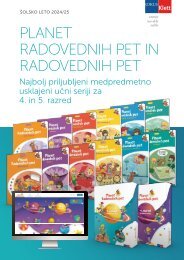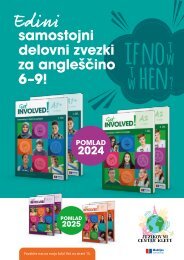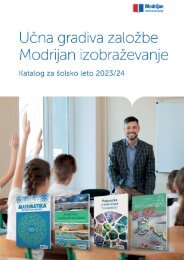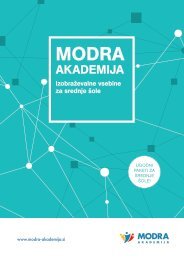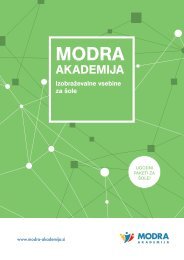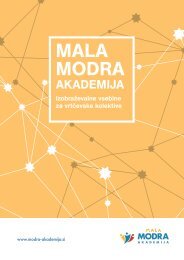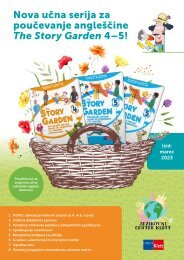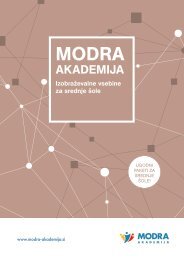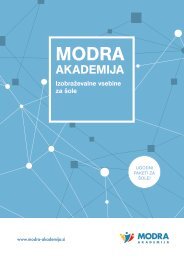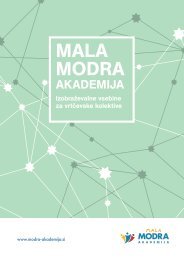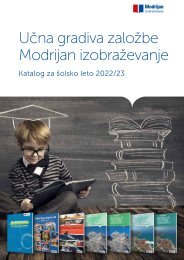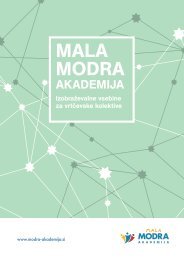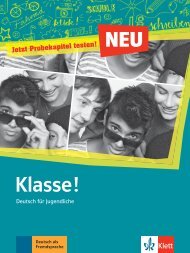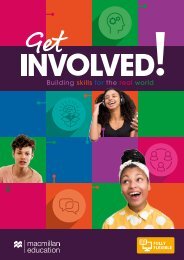Create successful ePaper yourself
Turn your PDF publications into a flip-book with our unique Google optimized e-Paper software.
WWW.DEVETLETKA.NET<br />
Dodatno gradivo za učitelja<br />
Serija <strong>Think</strong> ponuja bogat nabor dodatnega gradiva za učitelja na<br />
www.devetletka.net, ki olajša pripravo na pouk in mu je v pomoč<br />
pri preverjanju in ocenjevanju znanja. Učiteljem, ki bodo uporabljali<br />
serijo <strong>Think</strong>, bodo poleg dodatnega gradiva brezplačno na voljo tudi<br />
učbeniki in delovni zvezki v elektronski obliki na www.iRokus.si.<br />
5.<br />
COMMUNICATION WORKSHEETS<br />
V pomoč pri urjenju sporazumevanja so za vsako enoto<br />
na voljo dodatni delovni listi, zasnovani za delo v paru.<br />
6.<br />
VIDEO WORKSHEETS<br />
Dodatni delovni listi omogočajo poglobljeno delo<br />
z videoposnetki ter spodbujajo ustvarjalnost in<br />
domišljijo prek igre vlog. Opremljeni so z navodili<br />
za učitelja, rešitvami in idejami za alternativno<br />
izpeljavo aktivnosti.<br />
7.<br />
LIFE SKILLS WORKSHEETS<br />
Delovni listi Life skills ponujajo dodatne<br />
možnosti za razvijanje socialnih veščin, kot<br />
so sočustvovanje, opravičevanje, sprejemanje<br />
drugačnosti, reševanje problemov in pomoč<br />
skupnosti. Na voljo so tudi navodila za učitelja,<br />
kako delovne liste kar najučinkoviteje uporabiti<br />
pri pouku.<br />
8.<br />
TESTI<br />
Za vsako enoto so na voljo testi za<br />
preverjanje slovnice, besedišča in vseh<br />
štirih jezikovnih spretnosti (s pripadajočimi<br />
zvočnimi posnetki za preverjanje slušnega<br />
razumevanja) na več ravneh zahtevnosti.<br />
9.<br />
PREZENTACIJE<br />
Prezentacije izbranih slovničnih struktur (present simple,<br />
present simple vs. present continuous, števni in neštevni<br />
samostalniki, whose in svojilni 's, past simple in naklonski<br />
glagoli za izražanje obveznosti), pripravljene v programu<br />
PowerPoint, nazorno predstavijo razlago slovničnih vsebin.<br />
28<br />
instruments) that students need. Ask two or three<br />
students to report back to the cla s on something<br />
interesting they found out abou their partners.<br />
Workbook page 12<br />
LISTENING<br />
1 1.20 As a warm-up, ask students to look at<br />
the pictures for 30 seconds to try to memorise its<br />
details, then ask them to close their books. If there is<br />
an IWB available, do this on the screen with books<br />
closed. Point ou the lettering A–C before you hide<br />
the picture so students can refer to the pictures<br />
more easily. Ask students: Which picture shows: a<br />
piano player? (B); a footba ler? (A); a sofa? (C); two<br />
adults? (A); a TV? (C); no girls? (C); somebody si ting?<br />
(B). Students then open their books to check their<br />
answers – how many did they get right? Direct<br />
students’ a tention to the sentences and check they<br />
understand headache. Then play the audio, pausing<br />
after each conversation so students can decide, in<br />
pairs, which picture they think it goes with. Check<br />
answers as a cla s.<br />
Answers<br />
1 B 2 A 3 C<br />
Audio Script Track 1.20<br />
Conversation 1<br />
Tom Carla! Please stop. I’ve got a headache. … Carla!<br />
Carla What is it, Tom?<br />
Tom Can you stop playing, please. I’ve got a headache.<br />
Carla You’ve always got a headache when I play the piano.<br />
Tom Maybe your piano playing gives me a headache!<br />
Carla I need to practise. I need to find a new talent. I know<br />
it’s there. One day when I’m famous …<br />
Tom You! Famous! Don’t make me laugh.<br />
Carla And that’s why I need to practise more.<br />
Conversation 2<br />
Lisa Mum, can I join the footba l club?<br />
Mum: I’m not sure, Lisa. What do you think, Bob?<br />
Dad Footba l. It’s not really for girls, is it?<br />
Lisa Don’t be so si ly, Dad. Lots of girls play footba l these<br />
days.<br />
Mum She’s right Bob. Don’t be so old-fashioned.<br />
Dad Hmmm. Can’t you just play in the garden with your<br />
brother?<br />
Lisa It’s not the same. I want to be in a team and meet new<br />
people.<br />
Mum It is a good way to meet new people and for Lisa to<br />
make new friends.<br />
Dad Oh, OK.<br />
Lisa You’re the best, Dad!<br />
Conversation 3<br />
Mum James. It’s time for dinner.<br />
Mum Come on, James. Dinner is ready.<br />
James So ry, Mum. What do you want?<br />
Mum I want you at the table. It’s dinnertime.<br />
James OK.<br />
James I love music. It’s great just having some time to do<br />
nothing – just listening to music.<br />
Mum Is it? I never have any time to listen to music. I’m too<br />
busy with my work … And looking after you lot.<br />
James And that’s why I love you, Mum.<br />
2 1.20 Before you play the audio again, give<br />
students the opportunity to complete the sentences<br />
with the details they remember from the first<br />
listening and check ideas in pairs. Drill the<br />
pronunciation of the names in the box (students<br />
repeat in chorus after you) so students wi l recognize<br />
them when they hear them. Play the recording,<br />
pausing after each conversation to a low time for<br />
students to note their answers. As you check answers,<br />
play the audio again, pausing a the relevant parts.<br />
Answers<br />
1 Lisa 2 James’s mum 3 James<br />
4 Carla 5 Lisa’s dad<br />
Why it’s good to have a hobby<br />
1 Refer students back to the people on top of the page<br />
and elici their names before asking them to match<br />
the statements with the co rect person. Students<br />
check answers in pairs before you check with the<br />
whole cla s. Give students 30 seconds to decide<br />
which of the three statements they agree with the<br />
most or is closes to their own experience. Ask<br />
students to te l the cla s which statemen they agree<br />
with the most and why.<br />
Answers<br />
1 B 2 C 3 A<br />
2 Students copy and enlarge the diagram so there is<br />
enough room to write a l the items in it. Pu the<br />
diagram up on the board, or on the IWB and discu s<br />
as a cla s why playing the piano is in the position<br />
it is and where you would put joining a tennis club.<br />
Students complete the activity individua ly whilst<br />
you monitor and help with ideas as nece sary. Move<br />
on to Exercise 3 when most students have completed<br />
their diagrams.<br />
Fast finishers<br />
Encourage students to add other hobbies to the diagram.<br />
They should include their own hobbies – this wi l help them<br />
later in Exercise 4.<br />
3 SPEAKING Write It helps me/you to… on the board,<br />
then ask students to read the example. Check<br />
comprehension by eliciting a translation in L1. Pairs<br />
then compare and discu s their diagrams. Encourage<br />
them to give each othe reasons, e.g. Playing the piano<br />
helps you to relax because music helps you to forget<br />
your problems. Monitor and help with vocabulary<br />
as nece sary. Encourage students to try to express<br />
thei real ideas and opinions bu to use English to do<br />
so. Avoid e ror co rection unless it really impedes<br />
27<br />
2 SPEAKING Allow two or three minutes for the<br />
pair-work activity. Monitor the conversations. As<br />
the focus is on fluency and educating the whole<br />
learner, avoid correcting errors unless they hinder<br />
comprehension. Check answers with the cla s.<br />
Answers<br />
a 7 b 5 c 4 d 3 e 6 f 1 g 2<br />
Optional extension<br />
Ask students to rank the ways of being healthy in order of<br />
importance and compare their ideas with their partner.<br />
Encourage them to try to give reasons for the ideas but stre s<br />
that there are no right or wrong answers. Pairs should try to<br />
agree on the top three most important ways to take care of<br />
themselves. Monitor and help with vocabulary as needed.<br />
Conduct whole-cla s feedback to find out what different<br />
pairs think are the most important things they should do to<br />
take care of themselves.<br />
Student’s Book page 14–15<br />
GRAMMAR<br />
Present simple review<br />
1 Students complete the sentences individually, then<br />
check back in the quiz. Ask them to compare answers<br />
in pairs before you check them as a cla s. Point out<br />
that Does and Do should take an initial capita le ter<br />
in 3 and 4 because they come a the beginning of the<br />
sentence. Try to elicit this information from the class<br />
before you tell them. Ask: How do the words ‘does’ and<br />
‘do’ change when you write them in the sentence?<br />
Answers<br />
1 says 2 don’t 3 Does 4 Do<br />
2 While the students are completing 1, you could copy<br />
the table with the different forms of do and does on<br />
the board with the verb forms gapped, then elicit<br />
the missing words from the cla s. Students work<br />
individually to complete the rules and compare<br />
answers in pairs before you check with the whole<br />
cla s. Elici the rules through concept-checking<br />
questions, for example: What’s different abou the verb<br />
after he, she or it? (We add an -s in positive sentences,<br />
we use doesn’t instead of don’t in negative sentences,<br />
and we use Does, not Do in questions.)<br />
Answers<br />
1 don’t 2 doesn’t 3 do 4 does<br />
3 Look at the example with the cla s and check<br />
students understand why these verb forms are used<br />
(poin to the relevant column on the table). Elicit or<br />
explain the meaning of roller coaster (say that you<br />
find them at amusement parks and fairs and it’s a<br />
kind of fas train that goes up and down a lot – you<br />
can do a rough drawing on the board to illustrate)<br />
and scared (make an appropriate facial gesture). You<br />
may also like to do number 1 together as a class.<br />
Students complete the sentences individually, then<br />
check in pairs before checking as a whole cla s.<br />
Answers<br />
1 doesn’t sleep, needs 2 Do … study, do<br />
3 cooks, doesn’t enjoy 4 Does … play, doesn’t<br />
5 don’t like, prefer 6 watches, doesn’t do<br />
Fast finishers<br />
Students rewrite the sentences in Exercise 3 so they are true<br />
for them and their families.<br />
Workbook page 10 and page 122<br />
PRONUNCIATION<br />
For practice of /s/, /z/, /ɪz/ sounds, go to<br />
Student’s Book page 120.<br />
VOCABULARY<br />
Hobbies<br />
1 To lead into the activity, ask students to look through<br />
pages 12–14 and find any hobbies mentioned so<br />
far. Stronger students could try and answer from<br />
memory. Elicit and write them on the board or ask<br />
students to come to the board to write them. Try to<br />
elicit phrases rather single words, e.g. play football,<br />
do cro sword puzzles. You could also elicit examples of<br />
students’ own hobbies. Students match the verbs with<br />
the nouns in the exercise individua ly, then check in<br />
pairs before a final check with the whole cla s. When<br />
checking answers, students may come up with other<br />
acceptable alternatives, for example: keep a blog,<br />
collect photos or write things. If they do, say tha these<br />
answers are po sible but ask: What other things do we<br />
keep/co lect/write? and elicit the preferred alternative<br />
from another student.<br />
Answers<br />
1 be 2 write 3 take 4 keep 5 co lect<br />
Fast finishers<br />
Students try to think o further hobbies where they write,<br />
take, keep or collect things, and make a list.<br />
Optional extension<br />
Test how we l students remember the co locations. Ca l out<br />
either the verb or the noun, and nominate a student to say<br />
the whole phrase. For example, you say: play or instrument,<br />
they say: play an instrument. Alternatively, put students in<br />
pairs to take turns to test each other in the same way.<br />
2 SPEAKING Look a the example with the cla so the<br />
task is clear to students: they must first ask a yes/no<br />
question, then follow it up with a wh-question, asking<br />
for more details. Students take turns to ask and<br />
answer questions about their hobbies in pairs, using<br />
the phrases from Exercise 1. Ask them to find at least<br />
two interesting things they could share with the rest<br />
of the cla s abou their partners. Monitor students’<br />
use of the various forms of the present simple. Make<br />
a note of any grammar e rors to go over at the end<br />
of the activity, but avoid interrupting conversations.<br />
Input any unfamiliar vocabulary (e.g. names of<br />
1 HAVING FUN<br />
26<br />
Objectives<br />
FUNCTIONS talking about routines and everyday activities;<br />
expressing likes and dislikes; giving warnings<br />
and stating prohibition<br />
GRAMMAR present simple review; like + -ing; adverbs of<br />
frequency<br />
VOCABULARY hobbies; co locations with have<br />
Student’s Book page 12–13<br />
READING<br />
1 If there is an interactive whiteboard (IWB) available<br />
in the classroom, the picture description would<br />
best be done as a heads-up activity with the whole<br />
class. Say sleeping, and nominate a strong studen to<br />
poin to the co rect picture on the board. The rest<br />
of the cla s check and confirm o reject answers.<br />
There may be some pictures that students disagree<br />
about. Remind them that each word should only be<br />
used once, so they should try and work out the best<br />
answer through elimination. Alternatively, students<br />
do the matching activity in pairs before checking<br />
answers with the whole cla s. Again, ask the rest of<br />
the cla s to check and confirm o reject answers.<br />
Answers<br />
1 C 2 G 3 H 4 B 5 A 6 E 7 F 8 D<br />
Optional extension<br />
Students work in pairs to test each other about the activities.<br />
They look at the photos, cover the exercises and take turns<br />
to point to a photo at random and ask: What’s this? Monitor<br />
the activity, and conclude things when most pairs have gone<br />
through a l the images.<br />
2 Check comprehension o fun by asking students<br />
to name activities they consider fun. Also check if<br />
students understand the difference between always,<br />
sometimes and never. Draw a line with 0% at one end<br />
and 100% at the other end on the board, and ask<br />
students to situate each adverb at the appropriate<br />
place on the line. Then students go through the list<br />
and complete the statements. Ask for a show of hands<br />
to find out which activitie students find the most fun<br />
(they could raise both hands for always and one hand<br />
for sometimes).<br />
3 SPEAKING Give groups two minutes or so to<br />
compare their ideas.<br />
4 SPEAKING Do the activity as a contest between<br />
groups: which group wi l be the firs to come up<br />
with at leas ten activities? Ask the winning group<br />
to te l the cla s their ten activities and write any<br />
new phrases on the board. The other student should<br />
cross off all the words they also have on their lists as<br />
they hear them, and tell you any other words they<br />
have thought of to be added to list on the board.<br />
Then give the groups a couple of minutes to discu s<br />
which activities they think are and aren’t fun. They<br />
have to try to find activities tha they agree about.<br />
Monitor and check the use of the new vocabulary.<br />
Ask a student from each group to report back on<br />
activities they a l agreed on, and activities that<br />
caused disagreement. How many activities do a l the<br />
students in the cla s agree on?<br />
5 1.17 Ask students to cover up the text on page<br />
13 and look at the title only, or display the page<br />
on the IWB if you use one, and zoom in to the title.<br />
Ask students wha they think the text is about and<br />
write their ideas on the board. Prediction helps<br />
motivate students to read and find out if they’re<br />
right. Check that students understand the meaning<br />
of take (good) care of (to look after) then ask them<br />
to read the introductory paragraph quickly to check<br />
their ideas. Elicit which predictions were co rect.<br />
Then ask the cla s to look a the pictures and elicit<br />
what the person is doing in each case. This is a good<br />
opportunity to teach the words smile, relax, cro sword<br />
puzzle and hobby if students don’t already know them.<br />
Play the audio for students to listen, read and match<br />
the pictures with the questions. Students compare<br />
answers in pairs before you check with the whole<br />
cla s.<br />
Answers<br />
A 2 B 5 C 3 D 1 E 6 F 4 G 7<br />
Taking care of yourself<br />
1 Ask the cla s: Why is it importan to take care of<br />
yourself? Elicit some simple ideas in response, such<br />
as: because it’s important to be healthy; you can’t<br />
enjoy life if you aren’t healthy, etc. Then give<br />
students a minute to go through the list and match<br />
the questions with the items in the list.<br />
HAVING<br />
1 FUN<br />
PRIROČNIK ZA UČITELJA<br />
Brian Hart, Herbert Puchta, Jeff Stranks & Peter Lewis-Jones<br />
Učitelj Datum Razred Predmet Teden Ura<br />
6. angleščina 7<br />
Učna tema –<br />
naslov ure<br />
Countries and nationalities<br />
Učna enota ONE WORLD<br />
Splošni cilji a) poslušanje in slušno razumevanje:<br />
• učenci poslušajo in razumejo navodila za delo<br />
• poslušajo in razumejo pogovor<br />
b) govorno sporočanje:<br />
• odgovarjajo na vprašanja<br />
• uporabljajo ustrezna jezikovna sredstva<br />
• govorijo o slikah, o tem, kaj se dogaja na njih<br />
c) branje in bralno razumevanje:<br />
• berejo navodila<br />
• berejo krajša besedila<br />
d) pisanje in pisno sporočanje:<br />
• napišejo krajši sestavek o sebi<br />
• napišejo odgovore na vprašanja<br />
Učni cilji a) izobraževalni:<br />
• pravilno tvorijo vprašanja in povedi glede na podatke<br />
• spoznajo samostalniško in pridevniško rabo<br />
b) jezikovne vsebine:<br />
• besedišče: države in narodnosti<br />
Učni pripomočki učbenik, delovni zvezek, IKT, šolski zvezek<br />
Učbenik/DZ <strong>Think</strong> 1<br />
Učne metode branje, pogovor, razlaga, poslušanje<br />
Učne oblike frontalna, individualna, delo v dvojicah<br />
Potek učne ure<br />
1. Pregled domače naloge<br />
Pogovorimo se o različnih sloganih, ki so jih učenci zapisali. Pohvalim izvirne predloge.<br />
2. UČB, str. 12/Countries and nationalities/1<br />
Učence spomnm na otroke, o katerih smo govorili prejšnjo uro. Povežejo jih z ustreznimi državami.<br />
Posamezniki narišejo njihove zastave na tablo. Nato odprejo učbenike in si ogledajo slike zastav. Med njimi<br />
poiščejo tiste, ki označujejo države, o katerih so govorili. Primerjajo jih z izdelki na tabli. V parih povežejo<br />
zastave z ustrezno državo in poslušajo posnetek z rešitvijo.<br />
Izvedemo kratek kviz z zastavami. Odgovarjajo skupinsko, ali pa izvedemo tekmovanje med skupinami.<br />
3. UČB, str. 12/Countries and nationalities/2<br />
Učenci si ogledajo preglednico s končnicami za posamezne narodnosti. Prepišejo jo v zvezek in dopišejo<br />
narodnosti v ustrezne stolpce. Primerjamo rezultate. Učenci po spominu dodajo še več držav in narodnosti iz<br />
kviza (npr. Slovenia – Slovenian, France – French, China – Chinese, Italy – Italian, Germany – German) ter<br />
poiščejo še kakšno novo končnico. Dodamo še ostale sosednje države (Austria, Croatia, Hungary).<br />
4. UČB, str. 12/Countries and nationalities/3<br />
Učenci si v parih zastavljajo vprašanja o zastavah.<br />
5. DZ, str. 16/Listening/1, 2, 3<br />
Predvajam posnetek. Učenci ob prvem poslušanju oštevilčijo otroke v vrstnem redu, kot jih slišijo na<br />
posnetku. Ob drugem poslušanju pod sličice zapišejo njihova imena. Razumevanje dokažejo še z nalogo 3 in<br />
obkrožijo pravilen odgovor.<br />
Domača naloga: DZ, str. 13/Countries and nationalities/1, 2<br />
Opombe:<br />
Učitelj Datum Razred Predmet Teden Ura<br />
6. angleščina 6<br />
Učna tema –<br />
naslov ure<br />
Mad about the Olympics<br />
Učna enota<br />
ONE WORLD<br />
Splošni cilji<br />
a) poslušanje in slušno razumevanje:<br />
• učenci poslušajo in razumejo navodila za delo<br />
b) govorno sporočanje:<br />
• odgovarjajo na vprašanja<br />
• aktivno sodelujejo v pogovoru<br />
• uporabljajo ustrezna jezikovna sredstva<br />
• govorijo o slikah<br />
c) branje in bralno razumevanje:<br />
• berejo navodila<br />
• berejo stavke<br />
d) pisanje in pisno sporočanje:<br />
• pišejo o sebi in svojih najljubših športnikih<br />
Učni cilji<br />
a) izobraževalni:<br />
• opisovanje sedanjosti<br />
• opisovanje slik<br />
b) jezikovne vsebine:<br />
• besedišče, povezano s športi in olimpijskimi igrami<br />
Učni pripomočki<br />
učbenik, delovni zvezek, IKT, šolski zvezek<br />
Učbenik/DZ <strong>Think</strong> 1<br />
Učne metode<br />
branje, pogovor, razlaga, poslušanje<br />
Učne oblike<br />
frontalna, individualna, delo v dvojicah<br />
Potek učne ure<br />
1. Pregled domače naloge<br />
Posamezniki preberejo svoje literarne prispevke. Pogovorimo se o izvirnosti, rabi besed in ritmičnosti.<br />
2. UČB, str. 10/3<br />
Učenci ob zaprtih učbenikih poslušajo posnetek spletne strani. Preverim splošno razumevanje slišanega. Nato<br />
učenci odprejo učbenike in ob ponovnem poslušanju naredijo nalogo.<br />
3. UČB, str. 11/Mad about the Olympics<br />
Učenci si ogledajo spletno stran in spoznajo otroke, ki so jih slišali na posnetku. Še enkrat si samostojno<br />
preberejo predstavitve in si poskušajo zapomniti čim več informacij. Pripravim lističe z imeni otrok iz besedila<br />
(toliko lističev, kolikor je učencev). Pred tablo povabim vse, ki so izbrali listič z imenom Pedro. Učenci čim bolj<br />
podrobno in natančno predstavijo otroka, ki so ga izbrali. Vsak v skupini pove en stavek, dokler ne izčrpajo<br />
vseh informacij. Beležim število stavkov. Zmaga skupina, ki je uporabila največ stavkov.<br />
4. UČB, str. 11/<strong>Think</strong> values<br />
Učenci v istih skupinah preberejo slogane za olimpijski duh in se odločijo za tistega, ki se jim zdi<br />
najprimernejši oz. najboljši. Pred razredom zagovarjajo svojo odločitev, lahko tudi v slovenščini.<br />
5. DZ, str. 14/Reading/1, 2<br />
Učenci v parih dopolnijo preglednico, nato pa preberejo besedilo v nalogi 2 in povežejo osebe z državami.<br />
Domača naloga: Učenci zapišejo svoj slogan za olimpijske igre.<br />
DZ, str. 14/Reading/3<br />
Opombe:<br />
Učitelj Datum Razred Predmet Teden Ura<br />
6. angleščina 5<br />
Učna tema –<br />
naslov ure<br />
One world<br />
Učna enota ONE WORLD<br />
Splošni cilji a) poslušanje in slušno razumevanje:<br />
• učenci poslušajo in razumejo navodila za delo<br />
b) govorno sporočanje:<br />
• odgovarjajo na vprašanja<br />
• aktivno sodelujejo v pogovoru<br />
• uporabljajo ustrezna jezikovna sredstva<br />
• govorijo o sliki<br />
c) branje in bralno razumevanje:<br />
• berejo navodila<br />
• berejo stavke<br />
d) pisanje in pisno sporočanje:<br />
• pišejo o svetovnih državah<br />
Učni cilji a) izobraževalni:<br />
• opisovanje sedanjosti<br />
• opisovanje slik<br />
b) jezikovne vsebine:<br />
• besedišče, povezano z državami po svetu<br />
Učni pripomočki učbenik, delovni zvezek, IKT, šolski zvezek<br />
Učbenik/DZ <strong>Think</strong> 1<br />
Učne metode pogovor, poslušanje, razlaga<br />
Učne oblike frontalna, individualna, delo v dvojicah<br />
Potek učne ure<br />
1. Motivacija<br />
Ob zaprtih učbenikih učenci poslušajo pesem (brez videa) in se osredotočijo na besedilo. Po poslušanju<br />
ugotovijo vsebino pesmi. Ponovno poslušajo ob slikovni spremljavi. Pogovorimo se o omenjenih državah: ali<br />
so jim bile vse poznane oz., ali so opazili kakšno napako, pomanjkljivost (omenjena je Jugoslavija).<br />
2. UČB, str. 10/Reading/1<br />
Učenci si ogledajo zemljevid sveta, se v parih posvetujejo in naredijo nalogo s povezovanjem držav in njihovih<br />
imen. Rešitev napišejo v zvezke.<br />
3. UČB, str. 10/Speaking/2<br />
V parih učenci pomislijo na znane osebnost iz danih držav, nato ideje povedo drug drugemu v odprti<br />
razpravi. Učenci dopolnijo svoje delo. Preverim razumevanje in uvedem vprašanja z odgovori: Where is<br />
Neymar from? Yes, he's from Brazil.<br />
4. Predvajam pesem Where are you from?, s pomočjo katere učenci vadijo vprašanje Where are you from? ter<br />
imena držav. Ob tem se zavedajo pomena našega sveta (planeta) in življenja v složnosti – THINK VALUE.<br />
Za utrjevanje imen držav v Evropi izvedemo kratek video kviz. Učence razdelim v dve skupini, rezultate sproti<br />
preverjam in točkujem pravilne odgovore.<br />
Domača naloga: Napišejo preprost rap z imeni držav in preprostim spremnim besedilom.<br />
Opombe:<br />
Name Class Date<br />
PHOTOCOPIABLE © Cambridge University Pre s 2017<br />
<strong>Think</strong> Level 1 Unit 1 Vocabulary Extension<br />
1 VOCABULARY EXTENSION<br />
1 Complete the sentences with the words in the list.<br />
There are two extra words.<br />
write | take | be | play | make | co lect | do play |<br />
walk | keep<br />
0. 0.Do you play the piano?<br />
1. Do you _____________ bo tle tops?<br />
2. I ____________ a blog about sports.<br />
3. I wan to ___________in your club.<br />
4. Do you _________ photos of your friends?<br />
5. They never __________ cro swords.<br />
6. Do you ___________ computer games?<br />
7. Sam and Tina ___________ a rabbit.<br />
2 Some of the sentences contain a mistake. Underline<br />
and co rec them.<br />
0. I make a pet cat. keep<br />
1. I make my blog on my tablet. _____<br />
2. Do you take computer games? _____<br />
3. Do you make photographs? _____<br />
4. I want to be in the tennis club. _____<br />
5. Do you play autographs? _____<br />
6. I play cro swords after school. _____<br />
7. Do you play the guitar? _____<br />
3 Complete the words. You have the firs two le ters.<br />
0. A the weekend, I have fun!<br />
1. I usua ly have a sh______ before breakfast.<br />
2. When I have a pr______, I speak to my teacher.<br />
3. I’m tired. I need to have a re______.<br />
4. Do you want to have di______ now? It’s pi za.<br />
5. Does Fiona have a good ti______ a the tennis<br />
club?<br />
4 Pu the words in order to make sentences.<br />
0. having / just / dinner / We’re<br />
We’re just having dinner.<br />
1. rest / having / a / Joe’s<br />
_________________________________<br />
2. problem / I / a / think / have / I<br />
_________________________________<br />
3. friends / having / her / Alice / fun / with / is<br />
_________________________________<br />
4. time? / Are / a / you / good / having<br />
_________________________________<br />
5. a / footba l game / shower / after / I /<br />
a / have<br />
_________________________________<br />
5 Complete the sentences.<br />
0. A: Do you like my shirt?<br />
B: Yes, it’s cool.<br />
1. Hey Sam. What are you _______ to?<br />
2. _______ out! There’s a car coming.<br />
3. _______ up. The train leaves in 5 minutes.<br />
4. A: Is Tina twelve years old?<br />
B: Yes, _______ right.<br />
5. Come _______ guys. We have to star the game<br />
now!<br />
6 Complete the classroom language with the co rect<br />
words.<br />
0. How do you say ‘Hello’ in Spanish?<br />
1. What does ‘empathy’ _________?<br />
2. A: How do you _________ that?<br />
B: It’s T–O–W–N.<br />
3. Put your hand _________ if you know the<br />
answer.<br />
4. Can I _________ a question?<br />
5. ________ me. Can you help me?<br />
6. ________ your books at page 15.<br />
7. Sorry, I don’t ________ the answer.<br />
VOCABULARY BASIC<br />
Name Class Date<br />
© Cambridge University Press 2018<br />
PHOTOCOPIABLE<br />
Th i n k<br />
Level 1 Basic Vocabulary Unit 1<br />
1 Complete the word to make phrases.<br />
1 d o a crossword<br />
2 e in a club<br />
3 p tennis<br />
4 ke photographs<br />
5 k p a pet<br />
6 te a blog<br />
7 col autographs<br />
8 y an instrument<br />
2 Underline the correct word.<br />
1 I write / play tennis.<br />
2 We collect / make autographs.<br />
3 She plays / writes a blog.<br />
4 I want to be / do in the club.<br />
5 Do you play / take photos?<br />
6 Th e y do / keep a pet.<br />
7 Do you take / play an instrument?<br />
8 Do you do / collect a crossword?<br />
3 Complete the sentences with a word from the<br />
list.<br />
have | time | have | speak | like<br />
rest | be | dinner<br />
1 I have a shower in the morning.<br />
2 Do you crosswords?<br />
3 We fun at the weekend.<br />
4 I to my teacher when I have a<br />
problem.<br />
5 I have a after lunch in the summer.<br />
6 Tom wants to in a tennis club.<br />
7 Does Fiona have at home?<br />
8 I have a good with my friends.<br />
4 Put the words in order to complete the<br />
sentences.<br />
1 having / just / dinner<br />
We are just having dinner.<br />
2 rest / having / a<br />
Joe is<br />
3 problem / I / a / have<br />
I think<br />
4 having / fun<br />
Alice is<br />
5 time / a / good / having<br />
Are you ?<br />
6. breakfast / shower / before / a<br />
I have<br />
5 Match the halves.<br />
1 Hurry up! d<br />
2 I like your shirt.<br />
3 Look out!<br />
4 Come<br />
5 Yes,<br />
6 What are you<br />
a<br />
A car is coming.<br />
b<br />
that’s right.<br />
c<br />
on guys.<br />
d<br />
The train is leaving.<br />
e<br />
up to?<br />
f<br />
It’s cool.<br />
6 Choose the correct word.<br />
1 How do you say / know ‘hola’ in English?<br />
2 What does ‘empathy’ spell / mean?<br />
3 How do you ask / spell you name?<br />
4 Put your hand on / up if you know the answer.<br />
5 Can I open / ask a question, please?<br />
6 Hear / Excuse me? Can you help me?<br />
7 Push / Open your books at page 10.<br />
8 Sorry, I don’t know / mean the answer.<br />
Name Class Date<br />
PHOTOCOPIABLE © Cambridge University Press 2017<br />
<strong>Think</strong> Level 1 Unit 1 Vocabulary<br />
1 VOCABULARY<br />
1 Match the words to make phrases.<br />
0. play a. a pet<br />
1. take b. a blog<br />
2. keep c. in a club<br />
3. play d. tennis<br />
4. write e. autographs<br />
5. co lect f. photos<br />
6. be g. an instrument<br />
7. do h. cro swords<br />
2 Choose the co rect words.<br />
0. Do you write / play the piano?<br />
1. Do you co lect / take autographs?<br />
2. I play / write a blog about my school.<br />
3. I wan to be / join in the swimming club.<br />
4. Do you make / take photos?<br />
5. They don’t do / play cro swords.<br />
6. Do you take / play computer games?<br />
7. Sam and Tina keep / co lect a pet.<br />
3 Match the sentence halves.<br />
0. I have a shower _e<br />
1. A the weekend, I __<br />
2. Do you like __<br />
3. When I have a problem, __<br />
4. In the summer I have __<br />
5. Do you have a __<br />
6. Tom wants to be __<br />
7. Does Fiona have __<br />
a. have fun!<br />
b. a famous violin player.<br />
c. a rest after lunch.<br />
d. dinner with her parents?<br />
e. before breakfast.<br />
f. I speak to my teacher.<br />
g. good time a the weekend?<br />
h. puzzles and cro swords?<br />
4 Pu the words in order to complete the sentences.<br />
0. are / having / just / dinner<br />
We are just having dinner.<br />
1. rest / having / a / is<br />
Joe____________________________<br />
2. problem / I / a / think / have<br />
I _____________________________<br />
3. having / fun / is<br />
Alice___________________________<br />
4. time / a / you / good / having<br />
Are___________________________?<br />
5. a / footba l game / shower / after / have / a<br />
I _____________________________<br />
5 Complete the sentences with the words in the list.<br />
There are three extra words.<br />
look | push | on | up | that’s | cool | hu ry | careful | do<br />
0. A: Do you like my shirt?<br />
B: Yes, it’s cool.<br />
1. Hey Sam. What are you ________ to?<br />
2. _________ out! There’s a car coming.<br />
3. _______ up! The train leaves in 5 minutes.<br />
4. A: Is Tina twelve years old?<br />
B: Yes, __________ right.<br />
5. Come ________ guys. We have to star the<br />
game now!<br />
6 Complete the classroom language with the words<br />
in the list.<br />
excuse | up | open | spe l | ask | know | say | mean<br />
0. How do you say ‘car’ in French?<br />
1. What does ‘boiled’ _________?<br />
2. A: How do you ___________ that?<br />
B: It’s T–O–W–N.<br />
3. Put your hand _________ if you know<br />
the answer.<br />
4. Can I ____________ a question?<br />
5. ___________ me. Can you help me?<br />
6. ___________ your books at page 15.<br />
7. So ry, I don’t ____ the answer.<br />
© Cambridge University Pre s 2018<br />
PHOTOCOPIABLE<br />
Th i n kLevel 1 Unit 3 Communication<br />
COMMUNICATION<br />
Name Class Date<br />
✃<br />
Unit 3: Food for Life<br />
Student A<br />
1 Some friends are coming to your house for<br />
dinner. You are going to prepare the meal and<br />
you need to ask Student B if you have enough of<br />
these things.<br />
Example:<br />
A: How much milk have you got?<br />
B: 2 litres.<br />
A: We don’t have enough milk.<br />
milk (you need 3 litres)<br />
sugar (you need 100 grams)<br />
ca rots (you need 3 ca rots)<br />
mushrooms (you need 8 mushrooms)<br />
eggs (you need 4 eggs)<br />
bread (you need one kilo)<br />
watermelons (you need 1 watermelon)<br />
2 You have these things. Answers Student B’s<br />
questions.<br />
4 apples<br />
200 grams of chocolate<br />
1 pepper<br />
1 onion<br />
20 eggs<br />
150 grams of bread<br />
1 banana<br />
3 Te l the class what you have. Make sure to use<br />
enough and not enough.<br />
Example:<br />
We have enough apples. We have too many eggs.<br />
Unit 3: Food for Life<br />
Student B<br />
1 You have these things. Answer Student A’s<br />
questions.<br />
2 litres of milk<br />
1 kilo of sugar<br />
5 ca rots<br />
4 mushrooms<br />
2 eggs<br />
1 kilo of bread<br />
2 watermelons<br />
2 Some friends are coming to your house for<br />
dinner. You are going to prepare the meal and<br />
you need to ask Student A if you have these<br />
things.<br />
Example:<br />
A: How many apples have you got?<br />
B: 4.<br />
A: We have enough apples<br />
apples (you need 4 apples)<br />
chocolate (you need 100 grams of chocolate)<br />
peppers (you need 2 peppers)<br />
onions (you need 2 onions)<br />
eggs (you need 10 eggs)<br />
bread (you need 1 kilo of bread)<br />
bananas (you need 4 bananas)<br />
3 Te l the class what you have. Make sure to use<br />
enough and not enough.<br />
Example:<br />
We don’t have enough onions. We have too much sugar.<br />
© Cambridge University Press 2018<br />
PHOTOCOPIABLE<br />
Th i n kLevel 1 Unit 2 Communication<br />
COMMUNICATION<br />
Name Class Date<br />
✃<br />
Unit 2: Money and How to Spend it<br />
Student A<br />
1 You have some information about Leo. Some<br />
of the information is about what he usually<br />
does and some is about what he is doing today.<br />
Complete the sentences using the correct form of<br />
the verbs in brackets.<br />
Leo usually goes to school by bus but today he<br />
(walk).<br />
He usually<br />
(drink) coffee for<br />
breakfast but today he is drinking tea.<br />
He usually wears blue jeans but today he<br />
(wear) black jeans.<br />
He usually<br />
(play) football after<br />
school but today he is playing basketball.<br />
2 Student B has information about Lucy. Ask<br />
questions to complete the table.<br />
Example:<br />
How does Lucy usually go to school?<br />
How is she going to school today?<br />
usually<br />
today<br />
1 go to school?<br />
2 drink for breakfast?<br />
3 wear?<br />
4 play after school?<br />
3 Now Student B will ask you questions about Leo.<br />
Use the information from Exercise 1 to answer<br />
his/her questions.<br />
Unit 2: Money and How to Spend it<br />
Student B<br />
1 You have some information about Lucy. Some<br />
of the information is about what she usually<br />
does and some is about what she is doing today.<br />
Complete the sentences using the correct form of<br />
the verbs in brackets.<br />
Lucy usually<br />
(walk) to school but<br />
today she is riding her bicycle.<br />
She usually drinks orange juice for breakfast but today<br />
she<br />
(drink) milk.<br />
She usually<br />
(wear) a blue top but<br />
today she is wearing a red top.<br />
She usually plays tennis after school but today she<br />
(play) computer games.<br />
2 Student A will ask you questions about Lucy. Use<br />
the information from Exercise 1 to answer his/her<br />
questions.<br />
3 Student A has information about Leo. Now ask<br />
questions to complete the table.<br />
Example:<br />
How does Leo usually go to school?<br />
How is he going to school today?<br />
usually<br />
today<br />
1 go to school?<br />
2 drink for breakfast?<br />
3 wear?<br />
4 play after school?<br />
© Cambridge University Press 2018<br />
PHOTOCOPIABLE<br />
Th i n kLevel 1 Unit 1 Communication<br />
COMMUNICATION<br />
Name Class Date<br />
✃<br />
Unit 1: Having fun<br />
Student A<br />
1 Answer the questions so they are true about you.<br />
Example:<br />
What do you always do on Saturday?<br />
I always meet my friends on Saturday.<br />
1 What do you often do after school?<br />
2 What do you usua ly do in the evening?<br />
3 What do you never do in the morning?<br />
4 How often do you drink coffee?<br />
5 How often do you go to the cinema?<br />
6 How often do you take photos?<br />
7 How often do you tidy you room?<br />
8 How often do you play an instrument?<br />
2 Work in pairs. Ask and answer about your<br />
sentences in Exercise 1.<br />
Example:<br />
A: What do you always do on Saturday?<br />
B: I always go swimming on Saturday.<br />
3 Te l the class about your sentences and your<br />
partner’s sentences. Are they the same or<br />
d i ff e r e n t ?<br />
Example:<br />
I often do my homework after school. Sofia never does<br />
her homework after school.<br />
Unit 1: Having fun<br />
Student B<br />
1 Answer the questions so they are true about you.<br />
Example:<br />
How often do you tidy you room?<br />
I always tidy my room.<br />
1 What do you always do on Saturday?<br />
2 What do you often do after school?<br />
3 What do you usually do in the evening?<br />
4 What do you never do in the morning?<br />
5 How often do you drink coffee?<br />
6 How often do you go to the cinema?<br />
7 How often do you take photos?<br />
8 How often do you play an instrument?<br />
2 Work in pairs. Ask and answer about your<br />
sentences in Exercise 1.<br />
Example:<br />
A: What do you often do after school?<br />
B: I often watch TV after school.<br />
3 Te l the class about your sentences and your<br />
partner’s sentences. Are they the same or<br />
d i ff e r e n t ?<br />
Example:<br />
I never do my homework after school. Paula often does<br />
her homework after school.<br />
HEY, LOOK AT<br />
3 THAT GUY!<br />
2 EP3 Watch the video and circle the co rect<br />
words.<br />
4 Circle the co rect answer in each situation.<br />
1 What can you te l me about him?<br />
a Stop it!<br />
b Te l me what you know.<br />
c A l I know is that he needs help.<br />
2 Do you know where he lives?<br />
a I gue s he doesn’t.<br />
b I’m not so sure.<br />
c That’s rea ly kind of you.<br />
3 I’m rea ly upset.<br />
a What’s going on?<br />
b That’s rea ly kind of you.<br />
c They need help.<br />
4 That’s everything I know about him.<br />
a Stop it!<br />
b Thanks for ca ling me.<br />
c I gue s you do.<br />
THINK THROUGH<br />
ROLE PLAY The phone ca l<br />
Work in pairs. Student A is Luke and Student B is<br />
Mrs Cromer. Write and act out the telephone<br />
conversation Luke had when he ca led Mrs Cromer<br />
in class.<br />
THINK ABOUT<br />
1 Work in groups and answer the questions.<br />
1 What is a charity? Check your answers in a dictionary.<br />
2 What charities do you know? Write a list and<br />
compare with your friends.<br />
1 Teacher What’s happening / going on?<br />
2 Teacher Tell us what / who you saw.<br />
3 Megan I’m not very / so sure.<br />
4 Mrs Cromer Thanks for ca ling / speaking to me.<br />
5 Olivia That’s really amazing / kind of you.<br />
THINK BACK<br />
3 Match the two parts of the sentences.<br />
1 c Ryan is annoyed because …<br />
2 The teacher is happy for Luke to use his<br />
phone in cla s because …<br />
3 Mrs Cromer is interested in the man because …<br />
4 Olivia is pleased in the end because …<br />
5 Ryan and Luke are amazed because …<br />
a she works for a charity that helps homele s people.<br />
b the homele s man is kind to Olivia.<br />
c the students are laughing at Olivia.<br />
d her necklace isn’t lost.<br />
e it’s important for him to ca l his neighbour.<br />
© Cambridge University Pre s 2015<br />
PHOTOCOPIABLE<br />
<strong>Think</strong> Level 1 Episode 3 Video Worksheet<br />
In the classroom<br />
In the park<br />
Say he lo. Explain why you<br />
are ca ling.<br />
I’m worried about …,<br />
Answer Mrs Cromer’s questions.<br />
He was si ting …, He looked …,<br />
Suggest somewhere to meet.<br />
How about …?<br />
Thank Mrs Cromer and say goodbye.<br />
A<br />
Answer and say he lo.<br />
Listen and ask for details about<br />
the man.<br />
What can you te l me …?<br />
Where…? What was he doing?<br />
Sugges that you meet.<br />
Let’s …, Why don’ t we …,<br />
Decide where you can meet. Thank Luke and say<br />
goodbye.<br />
Thanks for ca ling me… That’s rea ly kind …<br />
B<br />
THE<br />
2 PICNIC<br />
2 EP2 Watch the video and circle the<br />
correct words.<br />
3 A I don’t know about you, but I want to see the<br />
new film at the cinema.<br />
B<br />
Great idea.<br />
4 A It was my birthday party last Saturday!<br />
B Oh no! I wasn’t there!<br />
A<br />
Don’t worry.<br />
5 A Are you coming now?<br />
B<br />
No,<br />
A<br />
OK. See you later.<br />
THINK THROUGH<br />
ROLE PLAY A different ending<br />
Work in groups. Imagine an alternative ending.<br />
Complete the mind map to help you. Then use these<br />
phrases from the video and Exercises 2 and 4 and<br />
your Student’s Book to help you. Write and perform<br />
an alternative ending to the video.<br />
THINK ABOUT<br />
1 Work in groups and answer the questions.<br />
1 Luke feels bad because he forgets something<br />
important about Olivia. Do you forget things like<br />
friends’ birthdays or plans you make? Make a list.<br />
2 In your group, compare your lists. How can you be<br />
a better friend? How can you say and show you<br />
are sorry?<br />
1 Luke I’m really sorry / silly, Olivia.<br />
2 Luke Sometimes I don’t think at all / much.<br />
3 Luke I’ve got something I must / need to do<br />
first.<br />
4 Megan I don’t know anything / about you, but ...<br />
5 Pizza guy One vegetarian special! Only / Just for<br />
you!<br />
THINK BACK<br />
3 Work with a partner. Answer the questions.<br />
1 Why does Luke say sorry to Olivia?<br />
2 What does Olivia say she can eat?<br />
3 Why doesn’t Luke play football at first?<br />
4 How does Olivia feel at the end of the video?<br />
4 Complete the mini-dialogues with suitable<br />
phrases from the list.<br />
I feel really bad. | Let’s go.<br />
I’ve got something to do. | It’s OK. | No problem.<br />
1 A Can I have some ham on my pizza?<br />
B<br />
Here you are.<br />
2 A I’m sorry. Sometimes I don’t think at all.<br />
B<br />
Don’t worry.<br />
© Cambridge University Press 2015<br />
PHOTOCOPIABLE<br />
<strong>Think</strong> Level 1 Episode 2 Video Worksheet<br />
Luke – doesn’t try to<br />
help Olivia, doesn’t<br />
say sorry, thinks Olivia<br />
can eat the fruit and<br />
chocolate …<br />
Megan – is annoyed<br />
with Luke …<br />
Ryan – thinks Olivia<br />
is silly, tries to make<br />
everyone stop arguing<br />
Olivia – feels upset …,<br />
doesn’t want to eat<br />
anything, leaves the park<br />
A new ending<br />
What do the characters<br />
say, do and feel?<br />
I don’ t understand.<br />
I wan to ki l you!<br />
She’s/He’s rea ly upset now!<br />
I don’ t believe it!<br />
How stupid of me/you!<br />
Poor you.<br />
What’s a l th excitement?<br />
I/You don’ think at a l sometimes!<br />
What about me?!<br />
So what?<br />
OLIVIA’S NEW<br />
1 HOBBY<br />
2 EP1 Watch the video and complete the<br />
sentences.<br />
4 Match the sentence with the reason the speaker<br />
says it.<br />
1 LUKE I’m glad you’re here.<br />
2 OLIVIA I don’t believe it!<br />
3 OLIVIA I wan to kill you!<br />
4 LUKE Now you can buy yourself a new camera.<br />
5 OLIVIA You’re the best!<br />
The speaker …<br />
a … is very surprised.<br />
b … is greeting friends.<br />
c … is saying thank you to a friend.<br />
d … is emba ra sed and annoyed.<br />
e … is explaining something.<br />
THINK THROUGH<br />
ROLE PLAY Olivia and her mum<br />
Work in pairs. Student A is Olivia and Student B is<br />
Olivia’s mum. Write and act out the conversation.<br />
THINK ABOUT<br />
1 Work in groups. How do friends help each<br />
other? Write a list of things you usua ly do for<br />
your friends.<br />
1 Olivia How of me!<br />
2 Olivia It’s brand !<br />
3 Megan you.<br />
4 Olivia What’s a l the ?<br />
5 Luke I want to show you .<br />
6 Olivia But I understand.<br />
THINK BACK<br />
3 Work with a partner. Are the sentences true or<br />
false? Co rect the false sentences.<br />
1 Olivia cries because her friends laugh at her.<br />
2 Everybody feels sad when Olivia has a problem<br />
with her camera.<br />
3 Luke invites his friends to his house because they<br />
a like pizza.<br />
4 Olivia feels emba ra sed when she sees herself<br />
on TV.<br />
5 Luke gives his prize to Olivia.<br />
© Cambridge University Press 2015<br />
PHOTOCOPIABLE<br />
<strong>Think</strong> Level 1 Episode 1 Video Worksheet<br />
A the park<br />
At Luke’s house<br />
You are online at home. You want to buy a new<br />
camera. Your mum comes to talk to you. She<br />
doesn’t know abou the money from Luke.<br />
Say he lo to your mum.<br />
Hi! How are you?<br />
Te l your mum you wan to buy a new camera.<br />
Your mum te ls you that cameras are expensive and<br />
you can’t buy a new one. Star to explain abou the<br />
TV show and the money.<br />
Just wait! … There’s a show on TV …<br />
They give the winner £250 …<br />
Luke is the winner this week …<br />
Luke wants me to … He’s the best! …<br />
Now I can buy …<br />
A<br />
You go to talk to Olivia. You don’t know about<br />
the money from Luke.<br />
Say he lo to Olivia.<br />
Olivia says she wants to buy a new camera. Te l her<br />
that cameras are very expensive. You don’ think she<br />
can buy a new one.<br />
I know you want a new camera, but … Poor you!<br />
Olivia talks about a TV show that gives money for<br />
videos. She tells you that Luke is the winner this week<br />
and he’s got £250.<br />
Listen to Olivia. You are very surprised.<br />
I don’ t believe it!<br />
B<br />
Life skills<br />
Life skills<br />
1<br />
1 <strong>Think</strong> about the photostory on page 18.<br />
1 Imagine you are Olivia. Your camera is broken.<br />
How do you feel?<br />
2 Imagine you are Olivia’s friend. Olivia te ls you<br />
her camera is broken. What do you say? What<br />
do you do?<br />
2 Read this email from Michael to his friend,<br />
Jake. Does he like his new school?<br />
Hi Jake,<br />
How are you? Thanks for your email and the<br />
photos! I like the holiday pictures, but my<br />
favourite is the class photo. Say ‘Hi’ to<br />
everyone for me! Who is the new girl next to you<br />
in the photo?<br />
I don’t like my new school very much. The<br />
teachers are mostly OK, but I can’t stand going<br />
to Maths now. Mr Allen, the teacher, always<br />
seems angry because I don’t know things that the<br />
rest of the class know from last year. I don’t<br />
think I can pass the exam we have next week<br />
because I don’t ask questions anymore.<br />
Another thing is that I haven’t got any friends.<br />
Everyone has got a small group of friends and<br />
isn’t interested in talking to me – ‘the new<br />
boy’. Luckily, I have a new mobile so I can<br />
spend break playing games, but it’s horrible<br />
when nobody wants to sit next to me in class,<br />
and the teacher moves someone to be my partner.<br />
Are you free to Skype this weekend? Tell me when<br />
is a good time for you, OK?<br />
Michael.<br />
3 SPEAKING Work in pairs. Discuss the questions<br />
about Michael.<br />
1 What are Michael’s problems at his new school?<br />
2 Imagine you are Michael. How do you feel?<br />
3 When do your friends and family fee like this?<br />
4 Do people like talking abou these feelings?<br />
4 Imagine you are Jake. Which of these sentences<br />
are good to say to Michael?<br />
● I’m here for you.<br />
● I’ve got some great<br />
friends!<br />
● I’m so ry you feel<br />
this way.<br />
● I hate Maths too.<br />
● Talking about<br />
feelings is stupid.<br />
● I understand how<br />
you feel.<br />
5 SPEAKING Work in pairs. Discuss and think of<br />
more sentences you can say to Michael. What<br />
things can you do?<br />
6 WRITING Write a short email to Michael. Use<br />
your ideas from Exercise 4 and 5 to help you.<br />
Don’t forget to include a time for him to Skype<br />
at the weekend!<br />
Empathy is understanding how other people feel. We need empathy to te l people we understand<br />
how they feel in bad situations. Sometimes, this is a l people need when they feel bad. But empathy<br />
can help us decide what we can do to help.<br />
Showing empathy<br />
<strong>Think</strong> Level 1 Life Skills 1 PHOTOCOPIABLE © Cambridge University Pre s 2017<br />
TIPS FOR SHOWING EMPATHY<br />
1 Listen to other people’s problems. Don’t<br />
always talk about your problems.<br />
2 When someone is explaining their problems,<br />
don’t say their problems aren’t important, or<br />
be critical.<br />
3 It’s not always nece sary to give advice.<br />
Sometimes just listening and understanding is<br />
enough.<br />
Name Class Date<br />
<strong>Think</strong> Level 1 Unit 1 Grammar extension PHOTOCOPIABLE © Cambridge University Pre s 2017<br />
1 GRAMMAR EXTENSION<br />
1 Complete the sentences with verbs in the present<br />
simple.<br />
0. Laila loves movies. She watches one every day!<br />
(watch)<br />
1. My sister always ___________ late. (get up)<br />
2. Peter ___________his car every Saturday. (wash)<br />
3. I ___________ on Sundays. (not work)<br />
4. The shop ___________at 9pm. (close)<br />
5. Teri ___________ meat. (not eat)<br />
6. Paul and Stan ___________ watching tennis. (not like)<br />
2 Rea range the words to make sentences.<br />
0. Liverpool / live / Mary / does / in<br />
Does Mary live in Liverpool?<br />
1. flowers / I / co lecting / garden / the / love from<br />
________________________________ .<br />
2. sea / never / Sara / swims / the / in<br />
________________________________ .<br />
3. I / Jane / and / have / often / together / fun school /<br />
after<br />
________________________________ .<br />
4. reading / history / can’t / they / stand / about<br />
________________________________ .<br />
5. teacher / every / day / homework / give / does your<br />
________________________________ ?<br />
3 Write sentences that are true for you using the<br />
adverbs o frequency in the list.<br />
always | often | sometimes | occasionally<br />
rarely | never<br />
0. chat with friends / night<br />
I always chat with friends at night.<br />
1. play basketba l / summer<br />
________________________________<br />
2. watch TV / morning<br />
________________________________<br />
3. eat out / weekends<br />
________________________________<br />
4. have a shower / at night<br />
________________________________<br />
5. watch videos on the computer / afternoon<br />
4 Write questions for the answers.<br />
0. Do you love walking on the beach?<br />
Yes, I love walking on the beach.<br />
1. ________________________________?<br />
Yes, my dad enjoys drinking co fee.<br />
2. What time ________________________?<br />
Sam usually goes to bed at 11pm.<br />
3. What ____________________________?<br />
I want to see Star Wars.<br />
4. Where ___________________________?<br />
Mr Stevens lives in Valencia.<br />
5. How often ________________________?<br />
I chat with friends every day after school.<br />
5 Use the words to make sentences.<br />
0. He / co lect / comics (+)<br />
He co lects comics.<br />
1. Wha time / they / usua ly / go to bed (?)<br />
________________________________<br />
2. She / enjoy / reading the newspaper (-)<br />
________________________________<br />
3. You / brush your teeth / every day (?)<br />
________________________________<br />
4. He / go / English cla s / three times / week (+)<br />
________________________________<br />
5. How often / you / take photos (?)<br />
________________________________<br />
6. She / write / a blog about cats (+)<br />
________________________________<br />
7. My cousin / do / any sport (-)<br />
________________________________<br />
6 Write sentences that are true for you.<br />
0. I often drink milk with dinner.<br />
1. I rea ly enjoy _________________.<br />
2. I can’t stand _________________.<br />
3. I don’t usually _________________.<br />
4. I have fun when _________________.<br />
5. I _________________if I have a problem with my<br />
homework.<br />
6. I _________________ studying languages.<br />
________________________________<br />
PHOTOCOPIABLE © Cambridge University Press 2018<br />
Th i n k<br />
Level 1 Basic Grammar Unit 1<br />
GRAMMAR BASIC<br />
Name Class Date<br />
1 Choose the correct word.<br />
1 I like / likes dogs.<br />
2 You live / lives near the park.<br />
3 She listen / listens to music.<br />
4 John take / takes photos.<br />
5 We collect / collects stamps.<br />
6 My sisters run / runs in the park.<br />
2 Use the words to make affirmative sentences.<br />
1 George / like / music<br />
George likes music.<br />
2 She / watch / TV.<br />
3 I / wash / my car on Sundays.<br />
4 We / make / pizza on Fridays.<br />
5 Alicia / walk / to school.<br />
6 My dog / sleep / a lot.<br />
3 Make negative sentences. Use don’t or doesn’t.<br />
1 Susan likes football.<br />
Susan doesn’ t like footba l.<br />
2 Tom watches TV.<br />
3 I wash my car on Sundays.<br />
4 We eat pasta on Fridays.<br />
5 They walk to school.<br />
6 My sister plays the piano.<br />
4 Choose the correct word.<br />
1 I don’t / doesn’t eat pasta.<br />
2 You don’t / doesn’t like football.<br />
3 He don’t / doesn’t play the piano.<br />
4 We don’t / doesn’t enjoy doing homework.<br />
5 Do / Does you write a blog?<br />
6 Do / Does Mary read the newspaper?<br />
5 Match the questions and answers.<br />
1 Does Mary have any brothers? f<br />
2 Do you like chocolate?<br />
3 Does Henry collect toys?<br />
4 Do your parents enjoy listening<br />
to pop music?<br />
5 Do you have homework today?<br />
6 Does Kimberly like reading?<br />
7 Do you like playing tennis?<br />
a<br />
No, he doesn’t. He collects coins.<br />
b<br />
No, I don’t!<br />
c<br />
Yes, I love it.<br />
d<br />
Yes, she does. She loves books.<br />
e<br />
No, they don’t. They prefer opera.<br />
f<br />
Yes, she has two.<br />
g<br />
No, I prefer watching it.<br />
6 Correct the underlined words.<br />
1 I can’t stand to read the newspaper.<br />
I can’ t stand reading the newspaper.<br />
2 I always eats lunch at 14:00.<br />
3 Karen doesnt mind working late.<br />
4 We nevers study in the evening.<br />
5 Does your mother likes cooking?<br />
6 Douglas sometime eats pizza.<br />
7 How o ft e n s do you take the bus?<br />
8 I dont like listening to opera.<br />
Name Class Date<br />
PHOTOCOPIABLE © Cambridge University Pre s 2017<br />
<strong>Think</strong> Level 1 Unit 1 Grammar<br />
1 GRAMMAR<br />
1 Choose the co rect option.<br />
0. I like / likes dogs.<br />
1. Robert live / lives near the park.<br />
2. They listen / listens to a lot of music.<br />
3. Jane take / takes photos of her friends.<br />
4. My best friend co lect / co lects stamps.<br />
5. Sports cars go / goes very fast.<br />
6. My sisters run / runs every afternoon.<br />
2 Complete the sentences with do, does, don’t or<br />
doesn’t.<br />
0. He doesn’t eat spinach.<br />
1. My friends ______ read the newspaper.<br />
2. ______ you play the piano?<br />
3. I ______ enjoy doing homework.<br />
4. _____ Mary write a blog?<br />
5. ______ it often rain here?<br />
3 Match the questions and answers.<br />
0. Does Mary have any brothers? g<br />
1. Do you like chocolate? ___<br />
2. Does Henry co lec toys? ___<br />
3. Do your parents enjoy pop music? ___<br />
4. Do we have homework for tomo row? ___<br />
5. Do you love reading? ___<br />
6. Do your grandparents live with you? ___<br />
a. No, he prefers coins.<br />
b. No, we don’t.<br />
c. No, I don’t.<br />
d. Yes, I love it. My favourite book is Dracula.<br />
e. No, they don’t. They live in another city.<br />
f. No, they prefer opera.<br />
g. Yes, she has two.<br />
4 Use the words to make sentences.<br />
0. George / like / ja z music (+)<br />
George likes ja z music.<br />
1. She / watch / TV after school (+)<br />
____________________________<br />
2. I / wash / my car every day (-)<br />
____________________________<br />
3. We / make / pi za on Fridays (+)<br />
____________________________<br />
4. Alicia / walk / to school (-)<br />
____________________________<br />
5. Fran’s sister / play / footba l (-)<br />
____________________________<br />
6. My dog / sleep / a lot (+)<br />
____________________________<br />
5 Co rec the mistakes.<br />
0. I can’t stand to read the newspaper.<br />
I can’t stand reading the newspaper.<br />
1. I eat always lunch at 14:00.<br />
_____________________________<br />
2. Karen doesnt mind working late.<br />
_____________________________<br />
3. We nevers study in the evening.<br />
_____________________________<br />
4. Does your mother likes cooking?<br />
_____________________________<br />
5. Douglas eats out one time a week.<br />
_____________________________<br />
6. Do you take the bus often to school?<br />
_____________________________<br />
6 Complete the e-mail with words in the list.<br />
have | sometimes | don’t | do | can’t | hate<br />
studying | love<br />
He lo. My name is Henry and I am 14 years old. I<br />
0 have one brother but I 1 _______ have any sisters.<br />
My brother plays footba l. I love 2 _______ History<br />
and English because they are my favourite subjects. I<br />
3 _______ go to the ma l with my friends and I<br />
4 _______ going to the cinema. What 5 _______ you<br />
like doing in your free time?<br />
Write soon, Pablo<br />
1.<br />
PRIROČNIK ZA UČITELJA<br />
PDF-oblika na www.devetletka.com vsebuje:<br />
• nasvete za izvedbo učnih ur,<br />
• dodatne informacije o osebah, ki se pojavijo v učbeniku,<br />
• rešitve nalog,<br />
• namige za dodatne aktivnosti,<br />
• namige za diferenciacijo,<br />
• aktivnosti za učence, ki hitro končajo delo,<br />
• prepisi zvočnih posnetkov,<br />
• rešitve nalog v delovnem zvezku.<br />
2.<br />
PREDLOG LETNEGA DELOVNEGA<br />
NAČRTA IN UČNIH PRIPRAV<br />
Predlog letnega delovnega načrta vsebuje pregled<br />
celotne vsebine po učnem načrtu, predlog učnih<br />
priprav pa je zamišljen kot scenarij vsake učne ure<br />
s predlogi vključevanja avdio- in videoposnetkov<br />
ter interaktivnih nalog iz elektronskega učbenika.<br />
3.<br />
GRAMMAR WORKSHEETS<br />
Za utrjevanje slovničnih struktur posameznih enot so<br />
učitelju na voljo delovni listi na treh ravneh zahtevnosti<br />
(osnovni, srednji in višji), ki omogočajo notranjo<br />
diferenciacijo in individualno prilagajanje pouka.<br />
Na voljo so tudi rešitve nalog na delovnih listih.<br />
4.<br />
VOCABULARY WORKSHEETS<br />
Za utrjevanje besedišča posameznih enot so učitelju na<br />
voljo delovni listi na treh ravneh zahtevnosti (osnovni,<br />
srednji in višji), ki omogočajo notranjo diferenciacijo in<br />
individualno prilagajanje pouka. Na voljo so tudi rešitve<br />
nalog na delovnih listih.<br />
BREZPLAČNO<br />
ZA VAS<br />
<strong>Think</strong> Starter Test 4 © Cambridge University Pre s 2016<br />
PHOTOCOPIABLE<br />
80<br />
6 Complete the sentences with two words in each gap.<br />
In my town, 0 there are lots of things to do. 1 a famous museum and there are lots of restaurants and cafés.<br />
There 2 great places to shop. My favourite place is the shopping centre.<br />
Not everything is good. 3 any parks. And 4 a train station. Also, there 5 cinema.<br />
That’s a big problem!<br />
7 Write sentences about your town/city.<br />
0 There isn’t a park in my town.<br />
1 There aren’t .<br />
2 There is .<br />
3 There are .<br />
4 There isn’t .<br />
5 There aren’t .<br />
8 Complete the sentences with the imperative form of the words in brackets. Use contractions where possible.<br />
0 Tu rn (turn) left next to the bank.<br />
1 For the library, (go) pas the supermarket, and it’s there.<br />
2 (not take) the bus, take the train.<br />
3 I’m hot. Please (open) the window.<br />
4 (not eat) this food. It’s rea ly bad.<br />
5 During the exam, be quiet and (not talk) to the person next to you.<br />
9 Complete the directions with words from the list.<br />
on | again | right | take | turn | past<br />
A Excuse me, where’s the park?<br />
B It’s here 0 on High Street. It’s on the<br />
1 , acro s from the supermarket.<br />
A Thanks. And where’s the library?<br />
B OK, 2 left into King Street. Go 3<br />
the supermarket and it’s there, opposite the<br />
chemist’s.<br />
A Great. And the cinema?<br />
B The cinema … Turn left and left 4 into<br />
Main Street. It’s about 20 minutes from here. Or just<br />
5 a bus!<br />
10 Complete the conversation with one word in each gap.<br />
SHOP ASSISTANT He lo, can I 0 help you?<br />
CUSTOMER Hi. I like this T-shirt, but it’s sma l. 1 you got a large one?<br />
SHOP ASSISTANT Sure. We’ve got these T-shirts here.<br />
CUSTOMER Great. How 2 are they?<br />
SHOP ASSISTANT They’re £40. But these blue ones are only £24.<br />
CUSTOMER The blue T-shirts are nice. I’ l take two.<br />
SHOP ASSISTANT OK! 3 £48, please.<br />
CUSTOMER<br />
4 you are. £50.<br />
SHOP ASSISTANT Thanks. And here’s your 5 – £2.<br />
CUSTOMER That’s great. Bye.<br />
TOTAL SCORE<br />
10<br />
5<br />
10<br />
10<br />
10<br />
<strong>Think</strong> Starter Test 4 © Cambridge University Press 2016<br />
PHOTOCOPIABLE<br />
TEST 4<br />
Circle<br />
Name Class Date<br />
0 ch e m i st’s<br />
1 tr _ _ n st _ t _ _ n<br />
2 l _ br _ ry<br />
3 m _ s _ _m<br />
4 r_ st_ _ r_nt<br />
5 s_p_rm_ rk_t<br />
3 Complete the sentences with the words in the list.<br />
next | front | behind | opposite | corner |<br />
between<br />
0 The bank is behind the computer shop.<br />
1 The café is in of the statue.<br />
2 The bookshop is the post office and the chemist’s.<br />
3 Bob’s house is on the of Main Street and Fremont Street.<br />
4 The shopping centre is to the park.<br />
5 My house is a big supermarket. I go there every week.<br />
4 the correct answers.<br />
0 There is / are two banks on this street.<br />
1 There isn’t / aren’t any nice cafés in my town.<br />
2 There is / Is there a chemist’s near here?<br />
3 There isn’t / aren’t any milk in the fridge.<br />
4 There is / are lots of statues in my city.<br />
5 Is / Are there a post office near here?<br />
5 Complete the sentences with a, some, or any.<br />
0 There is a shower in the bathroom.<br />
1 There aren’t people here today.<br />
2 There are interesting things in the museum.<br />
3 Are there parks in your town?<br />
4 There is famous statue in my city.<br />
5 There are nice people in my class.<br />
5<br />
5<br />
10<br />
10<br />
5<br />
1 Write the numbers and prices.<br />
0 eight dollars and ninety-nine cents $ 8.9 9<br />
1 two hundred and fifty<br />
2 one thousand and twenty pounds £<br />
3 five hundred and sixty-eight<br />
4 twelve forty-nine £<br />
5 eighty-five euros and thirty cents €<br />
2 Write the places in a town/city.<br />
E X TEN S I O N TEST 4<br />
10<br />
10<br />
5<br />
50<br />
Name Class Date<br />
1 Complete the questions with the co rect form<br />
of to be.<br />
0 Is there a library in Du ltown?<br />
1 there any supermarkets?<br />
2 there a train station?<br />
3 there any banks?<br />
4 there a park?<br />
5 there a chemist’s?<br />
2 Complete the sentences about Dulltown.<br />
0 There isn’ t a library. (X)<br />
1 lots of supermarkets. (ti)<br />
2 a train station. (X)<br />
3 two banks. (ti)<br />
4 a nice park. (ti)<br />
5 a chemist’s. (X)<br />
3 Complete the sentences with some or any.<br />
I live in a sma l town ca led Du ltown. It’s an OK place,<br />
but there aren’t 0 any interesting things to do here.<br />
There aren’t 1 cinemas or libraries, but<br />
there is a sma l park. But that’s only good for sma l<br />
children. There are 2 cafés, but there aren’t<br />
3 restaurants. There is a supermarket, and<br />
some banks, but there aren’t 4 good shops.<br />
There isn’t a shopping centre here. There’s a museum,<br />
and there are 5 interesting things to see in it,<br />
but I don’t go to the museum every day!<br />
4 Put the words in the co rect order to make<br />
sentences.<br />
0 there / are / banks / any / near here ?<br />
Are there any banks near here?<br />
1 town / aren’t / parks / there / any / in this<br />
2 my house / sma l / supermarkets / some / near /<br />
are / there<br />
4 to eat / there / any / places / aren’t / good<br />
5 famous / there / buildings / any / are ?<br />
5 Circle the correct words.<br />
0 New York is a great place. Go / You go there in<br />
the spring. It’s rea ly cool.<br />
1 It’s my party tomo row. Forget not / Don’t forget<br />
about it!<br />
2 In the cinema, don’t use / you don’t your phone.<br />
3 Please open / you open the window. I’m hot.<br />
4 Listen / You listen to me. I want to say something.<br />
5 Don’t take / Take not a taxi. Taxis are expensive.<br />
6 Complete the sentences with the imperative<br />
forms of the verbs in the list. Use the positive or<br />
negative form.<br />
eat | hu ry | be | turn | try | have<br />
0 A This is a nice cake.<br />
B Yes, but don’ t eat it! It’s for George’s<br />
birthday!<br />
1 A Where’s the train station?<br />
B It’s near here. Just left at the end of<br />
the street.<br />
2 A Thanks for everything.<br />
B No problem. a nice day!<br />
3 A I like these shoes.<br />
B Yes, but them on before you buy<br />
them.<br />
4 A I’m rea ly wo ried about my exam tomo row.<br />
B wo ried! You always do we l in<br />
exams.<br />
5 A What time is the train?<br />
B It’s in two minutes. !<br />
TOTAL SCORE<br />
3 for vistors / interesting / there / places / are / any ?<br />
<strong>Think</strong> Starter Extension Test 4 PHOTOCOPIABLE © Cambridge University Pre s 2016<br />
10<br />
5<br />
10<br />
ANGLEŠKE<br />
PLOŠČICE<br />
Selma Gruban<br />
ANGLEŠKE PLOŠČICE<br />
Didaktično gradivo omogoča strukturiran in multisenzoren<br />
pristop k poučevanju angleške slovnice, ki učenca prek<br />
didaktične igre aktivno vključi v učni proces. Vsebuje<br />
vadnico za učence, priročnik za učitelje, večbarvne<br />
ploščice z elementi jezika in kodo za dostop do<br />
interaktivnega gradiva.<br />
+ didaktični pripomoček<br />
NOVO<br />
POMLAD<br />
2020<br />
12 13




